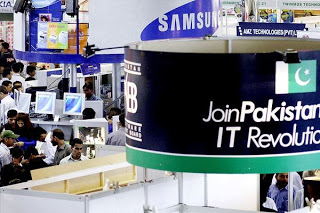Major IT Projects to Enhance Services and Fight Corruption in Pakistan
By Riaz Haq
CA
IT projects ranging from automated meter reading and computerized land records management to online education and mobile banking are now at various stages of implementation across Pakistan. In a report just released the World Bank calls these projects "unprecedented in the public sector in developing countries". The objective of these efforts is to reduce corruption, increase productivity and improve service delivery in both private and public sectors. Here's a brief description of five key areas where information technology penetration is visible:

1. Automated Meter Reading:
Automatic Meter Reading (AMR) project has been rolled out across the country with the help of the United States Agency for International Development (USAID). It is aimed at reducing power theft which accounts for 20-30% of all power generated in Pakistan. It will provide accurate electronic meter readings with little human intervention, using technology to transmit meter readings data via GSM/GPRS and Radio Frequency. It is expected to help power distribution companies (DISCOs) to monitor electricity consumption trends for different consumer categories, understand demand patterns, reduce electricity losses significantly and increase their revenues. Initial AMR pilots indicate significant reduction of power theft in Lahore.
In addition to automatic reading of consumer meters, smart meters have been installed with the support of USAID on incoming and outgoing feeders at all nine government-owned electric utilities. These will help move toward building of a smart national grid to better manage power generation, transmission and distribution in the country.
2. Mobile Governance:
The Punjab government is deploying smartphone applications to crack down on absentee mobile government workers and their corrupt practices. As part of this project, the government employee must send his or her picture and a report of interaction with citizens along with GPS coordinates. For example, an agricultural pest control official required to visit farmers must file reports of his findings and actions in real time via a smartphone app.
An SMS soliciting feedback from citizens is sent out after each such visit or interaction. Responses from users are logged into a central database, and the data then analyzed and mapped. Call centers have also been trained to contact those who do not respond or are unable to read the text due to illiteracy. More than three million users of public services have so far been contacted since the summer of 2012, with both positive and negative feedback, according to the World Bank report. “Sir, we went to the hospital yesterday. They asked for 1500 rupees [in bribes]. We didn’t have the money so we left,” reads one of the reports about a hospital in Lahore, the provincial capital. The feedback is actively monitored by the office of the Chief Secretary – the top civil servant in the province – to manage the performance of officials.
3. Computerized Land Records:
Provincial land departments in Pakistan regularly show up as the most corrupt in Transparency International surveys conducted every year. In fact, most Pakistanis refer to the culture of corruption in Pakistan as "patwari culture". For the uninitiated, a patwari is a low level official in the land department responsible for keeping land title records. Corrupt patwaris either deliberately misplace such records or delay issuing land title papers when citizens refuse to pay bribes. With digitization of such records, citizens will be able to check and confirm titles to lands on a computer screen by entering their computerized national identity card (CNIC) number. Corrupt patwaris are trying to undermine the computerization project.
4. Education and Training:
Pakistan has been at the forefront of using information technology to increase literacy and offer higher education. A pilot program in the country has demonstrated the effectiveness of pushing mass literacy through the use of cell phone text messaging capability.
UNESCO has recently also started a post-literacy project in Pakistan based on mobile technology. The Mobile Based Post Literacy program is targeted at young rural women, aged between 15 and 25, by keeping them interested in literacy through the mobile phone.
The concept of virtual instruction is finding its way to K-12 education as well. An increasing number of Pakistanis are drawn to various online sites. Silicon Valley NEDians have launched Learntive , an effort to offer digitized lessons in high-school courses. Virtual Education for All is a local Pakistani initiative extending the concept to primary level.
Virtual University(VU) and Allama Iqbal Open University (AIOU) offer distance learning programs using information technology. Pakistan's Virtual University (VU) has won the Outstanding New Site Award 2012 for an Open CourseWare website which was created in 2011.
5. Mobile Banking:
Combination of growth of mobile phones and ease of mobile money transfers have enabled many Pakistanis to have access to financial services for the first time in their lives.
In a country where only 22% of the population owns bank accounts and more than 70% owns mobile phones, mobile banking is proving to be the fastest way to promote financial inclusion considered by experts to be essential to lift people out of poverty. Benefits include easy access for rural customers to banking services through agents in villages without bank branches, better documentation of the economy, enlarging of the tax-base and efficiency of economic transactions.
Summary:
Increasing use of computers and mobile phones is enabling broad adoption of information technology in Pakistan. It has the potential to increase transparency, enhance individual productivity and improve standards of living of ordinary citizens.
------------------------------------------------------------------------------
Back to Pakistanlink Homepage

